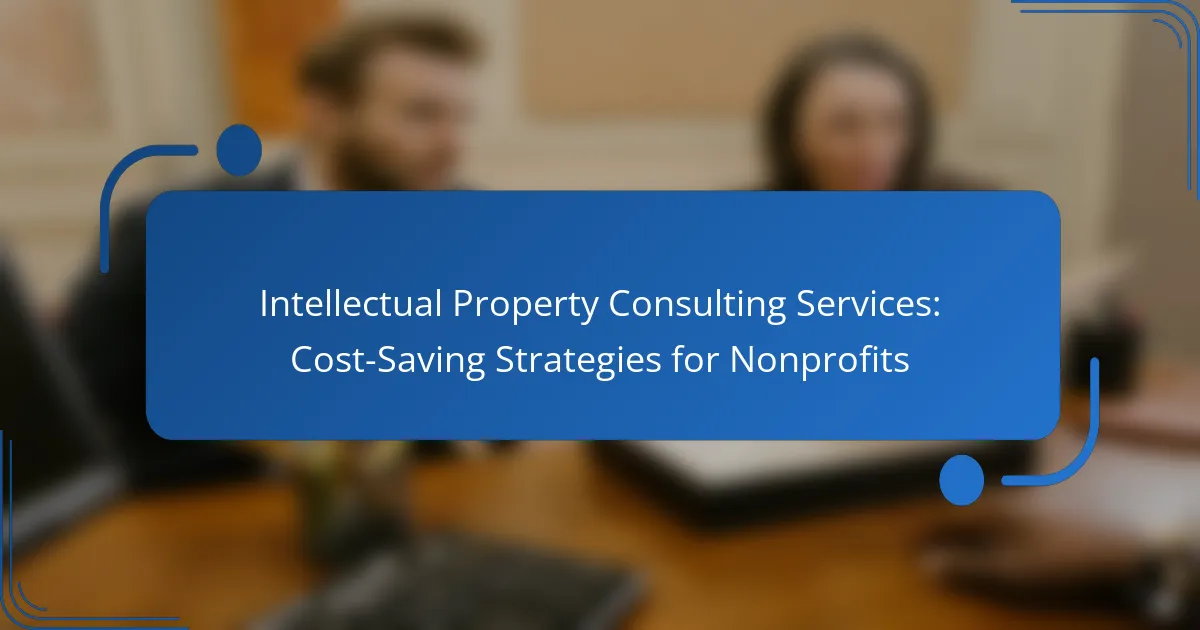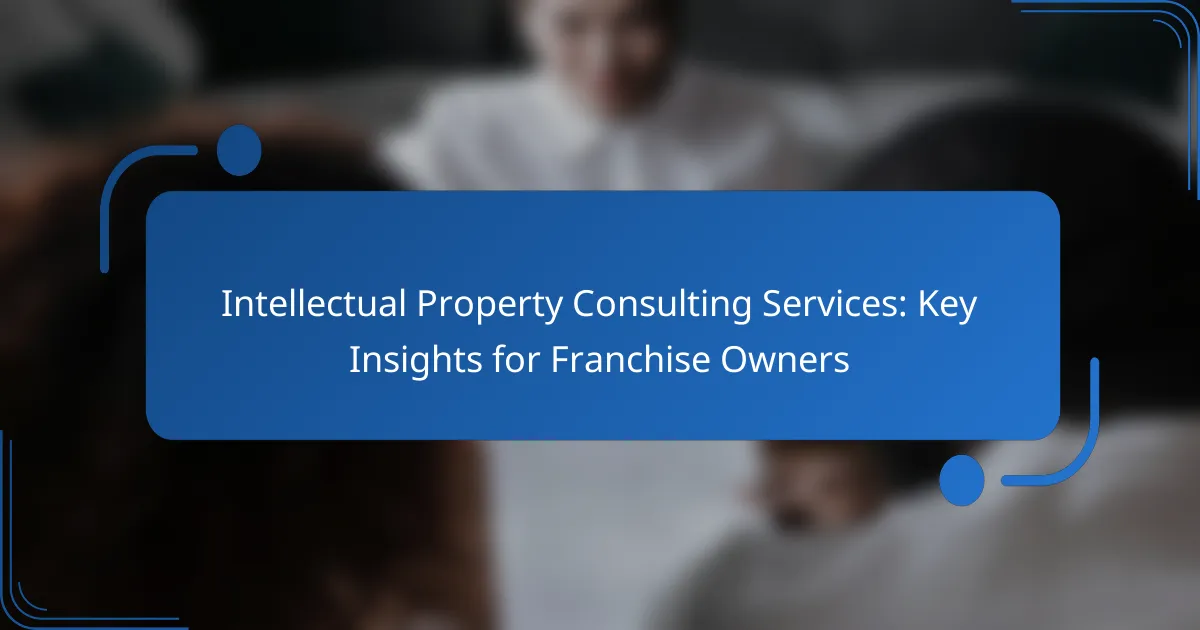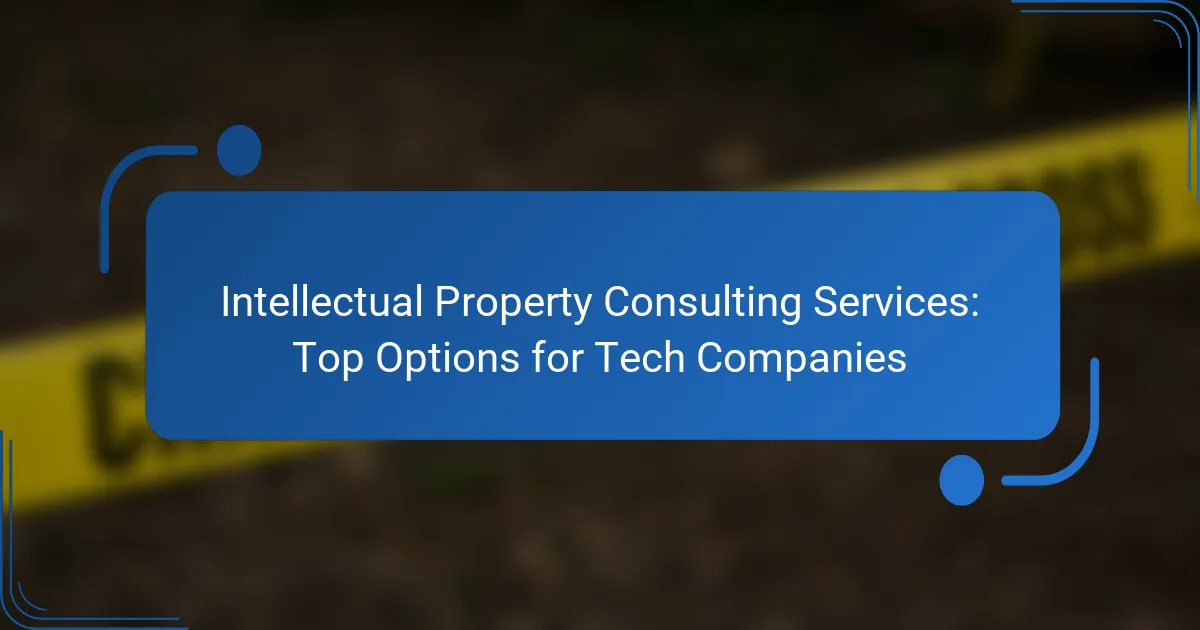Intellectual property consulting provides small businesses with essential support in protecting their innovations and strengthening their competitive edge. By navigating the complexities of IP laws, these services ensure that unique ideas are safeguarded and effectively utilized, allowing entrepreneurs to focus on growth and innovation.

What Are the Benefits of Intellectual Property Consulting for Small Businesses?
Intellectual property consulting offers small businesses crucial advantages by safeguarding their innovations and enhancing their market position. These services help entrepreneurs navigate the complexities of IP laws, ensuring their unique ideas are protected and leveraged effectively.
Protection of unique ideas
Intellectual property consulting helps small businesses secure their unique ideas through patents, trademarks, and copyrights. By registering these protections, businesses can prevent competitors from using their innovations, which is vital for maintaining a competitive edge.
Consultants can guide businesses in identifying what aspects of their products or services can be protected. This includes not only inventions but also branding elements like logos and taglines, which can be crucial for differentiation in the market.
Increased market competitiveness
With effective intellectual property strategies, small businesses can enhance their competitiveness in the market. By protecting their innovations, they can establish a unique selling proposition that attracts customers and builds loyalty.
Additionally, having a strong IP portfolio can deter competitors from entering the market, as they may be less inclined to challenge a business with established protections. This can lead to increased market share and profitability over time.
Enhanced brand value
Intellectual property consulting can significantly enhance the brand value of small businesses. By securing trademarks and copyrights, businesses create a recognizable identity that resonates with consumers, fostering trust and loyalty.
Moreover, a well-protected brand can increase its valuation, making it more attractive to investors or potential buyers. This is particularly important for businesses looking to expand or sell in the future.
Risk management
Engaging in intellectual property consulting helps small businesses manage risks associated with infringement and litigation. By understanding IP laws and regulations, businesses can avoid costly legal disputes that could arise from unintentional violations.
Consultants can also assist in conducting IP audits to identify potential vulnerabilities in a business’s portfolio, allowing for proactive measures to mitigate risks before they escalate.
Access to funding opportunities
Having a solid intellectual property strategy can open doors to funding opportunities for small businesses. Investors often look for businesses with strong IP protections, as these can indicate a lower risk and a higher potential for return on investment.
Consultants can help businesses prepare their IP portfolios for presentations to investors, highlighting the value and uniqueness of their innovations. This can significantly enhance the chances of securing funding from venture capitalists or angel investors.

How Can Small Businesses Choose the Right IP Consultant?
Small businesses can choose the right intellectual property (IP) consultant by evaluating their industry experience, checking client testimonials, assessing service offerings, and considering pricing structures. These steps help ensure that the consultant aligns with the business’s specific needs and budget.
Evaluate industry experience
When selecting an IP consultant, it’s crucial to evaluate their industry experience. Look for consultants who have worked with businesses similar to yours, as they will better understand the unique challenges and opportunities in your sector.
Consider asking potential consultants about their past projects and the results achieved. A consultant with a solid track record in your industry can provide tailored advice and strategies that are more likely to succeed.
Check client testimonials
Client testimonials offer valuable insights into a consultant’s effectiveness and reliability. Seek out reviews and feedback from previous clients to gauge their satisfaction and the consultant’s ability to deliver results.
Look for testimonials that highlight specific outcomes, such as successful patent applications or effective trademark registrations. This information can help you assess whether the consultant is a good fit for your business.
Assess service offerings
Different IP consultants offer varying services, so it’s essential to assess what each consultant provides. Some may specialize in patents, while others focus on trademarks or copyright issues.
Make a list of the services your business requires and ensure the consultant can meet those needs. A comprehensive service offering can save you time and money by addressing multiple IP concerns in one place.
Consider pricing structures
Pricing structures for IP consulting can vary widely, so it’s important to consider your budget. Some consultants charge hourly rates, while others may offer fixed fees for specific services.
Request detailed quotes from several consultants to compare costs. Be cautious of unusually low fees, as they may indicate a lack of experience or quality. Aim for a balance between cost and the level of expertise offered.
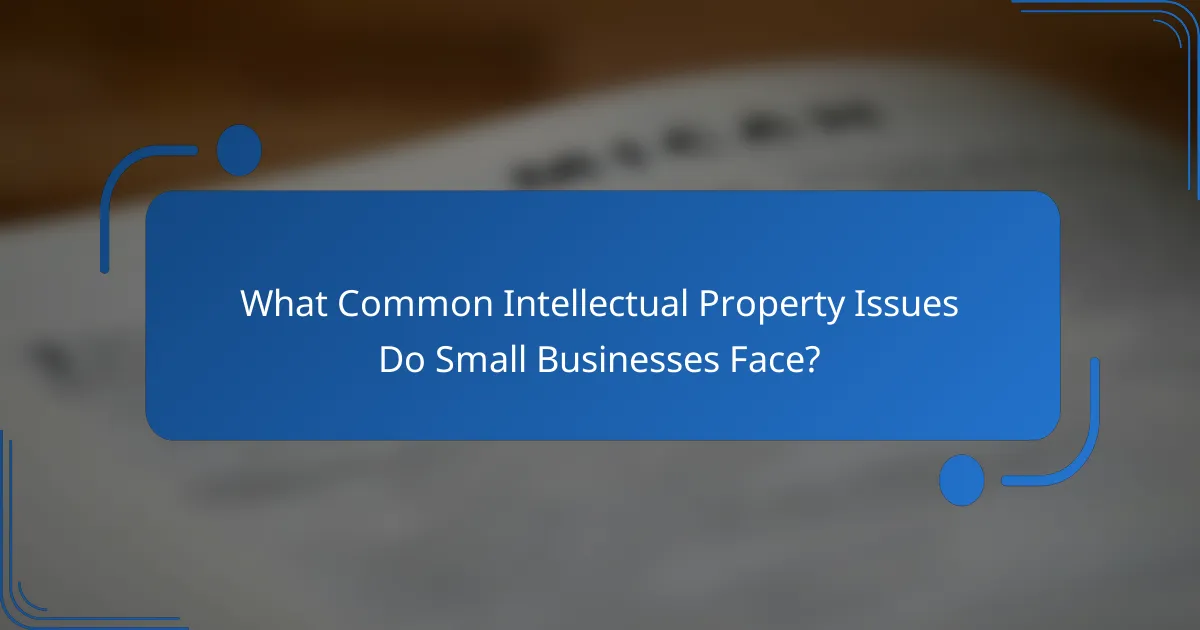
What Common Intellectual Property Issues Do Small Businesses Face?
Small businesses often encounter various intellectual property issues that can hinder their growth and innovation. Key challenges include trademark infringement, patent disputes, and copyright violations, each requiring careful management to protect business interests.
Trademark infringement
Trademark infringement occurs when a business uses a mark that is identical or confusingly similar to a registered trademark owned by another entity. This can lead to legal disputes and potential financial losses. Small businesses should conduct thorough trademark searches before launching their brands to avoid conflicts.
To protect against trademark issues, consider registering your trademarks with the appropriate authorities, such as the United States Patent and Trademark Office (USPTO) in the U.S. or the European Union Intellectual Property Office (EUIPO) in Europe. Regularly monitor the market for potential infringements and be prepared to enforce your rights if necessary.
Patent disputes
Patent disputes arise when one party claims that another has infringed on their patented invention. Small businesses may face challenges if they unknowingly use patented technology or if competitors accuse them of infringement. Understanding the patent landscape in your industry is crucial.
To mitigate risks, conduct patent searches and consider obtaining legal advice before developing new products. If faced with a patent dispute, evaluate options such as licensing agreements or negotiating settlements to resolve the issue without costly litigation.
Copyright violations
Copyright violations occur when someone uses a copyrighted work without permission, which can include text, images, music, or software. Small businesses may unintentionally infringe on copyrights by using materials found online without proper licensing. This can lead to legal action and financial penalties.
To avoid copyright issues, always seek permission before using someone else’s work and consider creating original content. Familiarize yourself with copyright laws relevant to your location, as regulations can vary significantly. Implementing a clear content policy can help safeguard your business against potential violations.
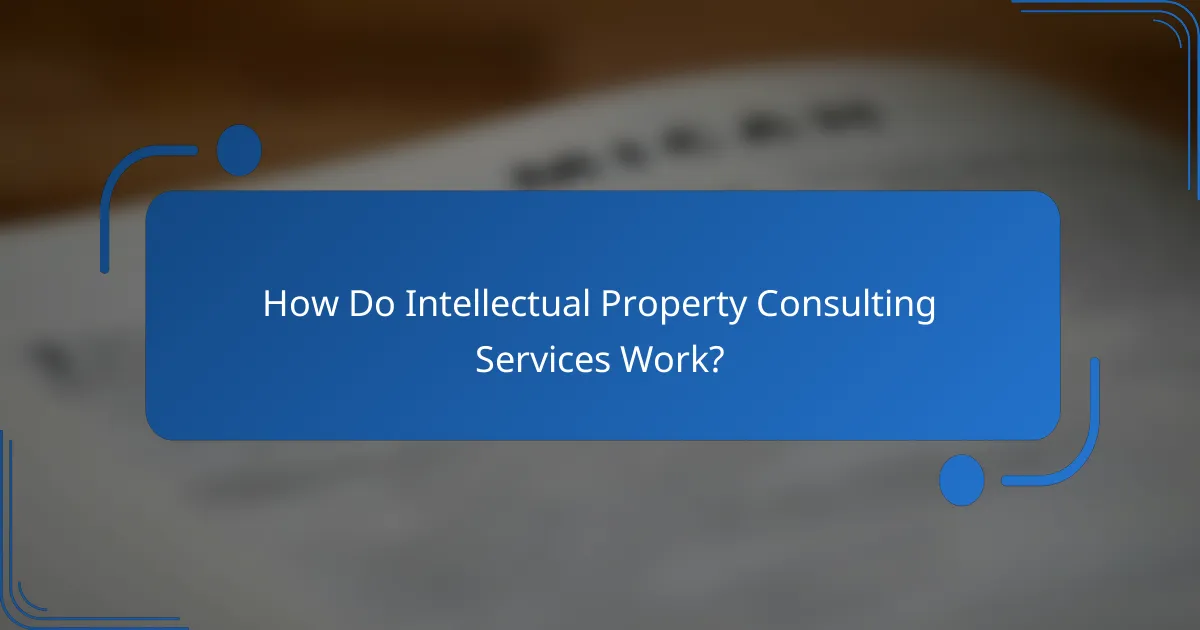
How Do Intellectual Property Consulting Services Work?
Intellectual property consulting services help small businesses identify, protect, and manage their intellectual property assets. These services typically involve a structured approach that includes initial consultations, strategy development, and ongoing support tailored to the specific needs of the business.
Initial consultation process
The initial consultation is a critical step where consultants assess the business’s existing intellectual property and its needs. During this phase, businesses can expect to discuss their products, branding, and any current IP issues they face.
Consultants may conduct a preliminary audit to identify potential IP assets, such as trademarks, copyrights, or patents. This helps in understanding the scope of protection required and sets the foundation for a tailored IP strategy.
IP strategy development
Once the initial assessment is complete, the next step is developing a comprehensive IP strategy. This strategy outlines how to protect and leverage intellectual property effectively, considering the business’s goals and market position.
Key components of an IP strategy may include filing for patents, registering trademarks, and establishing copyright protections. Consultants often provide guidance on prioritizing these actions based on potential return on investment and market relevance.
Ongoing support and monitoring
Ongoing support and monitoring are essential for maintaining the effectiveness of an IP strategy. Consultants typically offer services such as regular audits, monitoring for potential infringements, and updates on relevant legal changes.
This continuous engagement helps businesses adapt their IP strategies as they grow and as market conditions change. Regular check-ins can also ensure that all IP assets remain protected and that the business maximizes its competitive advantage.
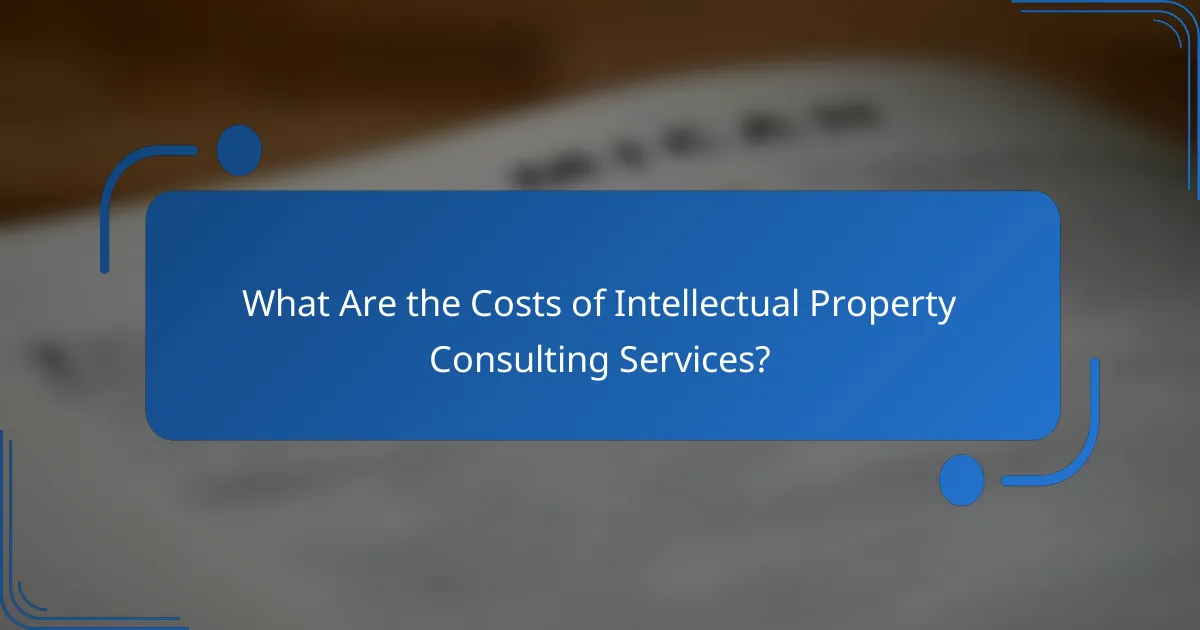
What Are the Costs of Intellectual Property Consulting Services?
The costs of intellectual property consulting services can vary significantly based on the type of service, the consultant’s expertise, and the complexity of the project. Small businesses should consider various pricing structures, including hourly rates, flat fees, and retainer agreements, to determine the most cost-effective option for their needs.
Hourly rates
Hourly rates for intellectual property consultants typically range from $100 to $500 per hour, depending on the consultant’s experience and the service’s complexity. For small businesses, it’s essential to clarify the expected hours for a project to avoid unexpected costs. Always request an estimate before starting any consulting engagement.
When engaging a consultant on an hourly basis, ensure that you understand what tasks are included in the rate. Some consultants may charge higher rates for specialized services, so it’s wise to compare rates among different professionals.
Flat fees for specific services
Flat fees are common for specific services such as trademark registration or patent application preparation. These fees can range from a few hundred to several thousand dollars, depending on the service’s complexity and the consultant’s reputation. For example, trademark registration might cost between $300 and $1,500, while patent applications can exceed $10,000.
Choosing a flat fee can provide clarity on costs upfront, making budgeting easier for small businesses. However, ensure that the fee covers all necessary services, including filing and follow-up communications.
Retainer agreements
Retainer agreements involve paying a consultant a set fee for ongoing services over a specified period. This arrangement can be beneficial for small businesses that require regular intellectual property advice, as it often results in lower hourly rates compared to ad-hoc consulting. Retainers can range from $1,000 to $5,000 per month, depending on the level of service provided.
When considering a retainer, assess your business’s needs and the expected frequency of consultations. A well-structured retainer agreement can provide both cost savings and consistent access to expert advice, helping you navigate the complexities of intellectual property management effectively.

